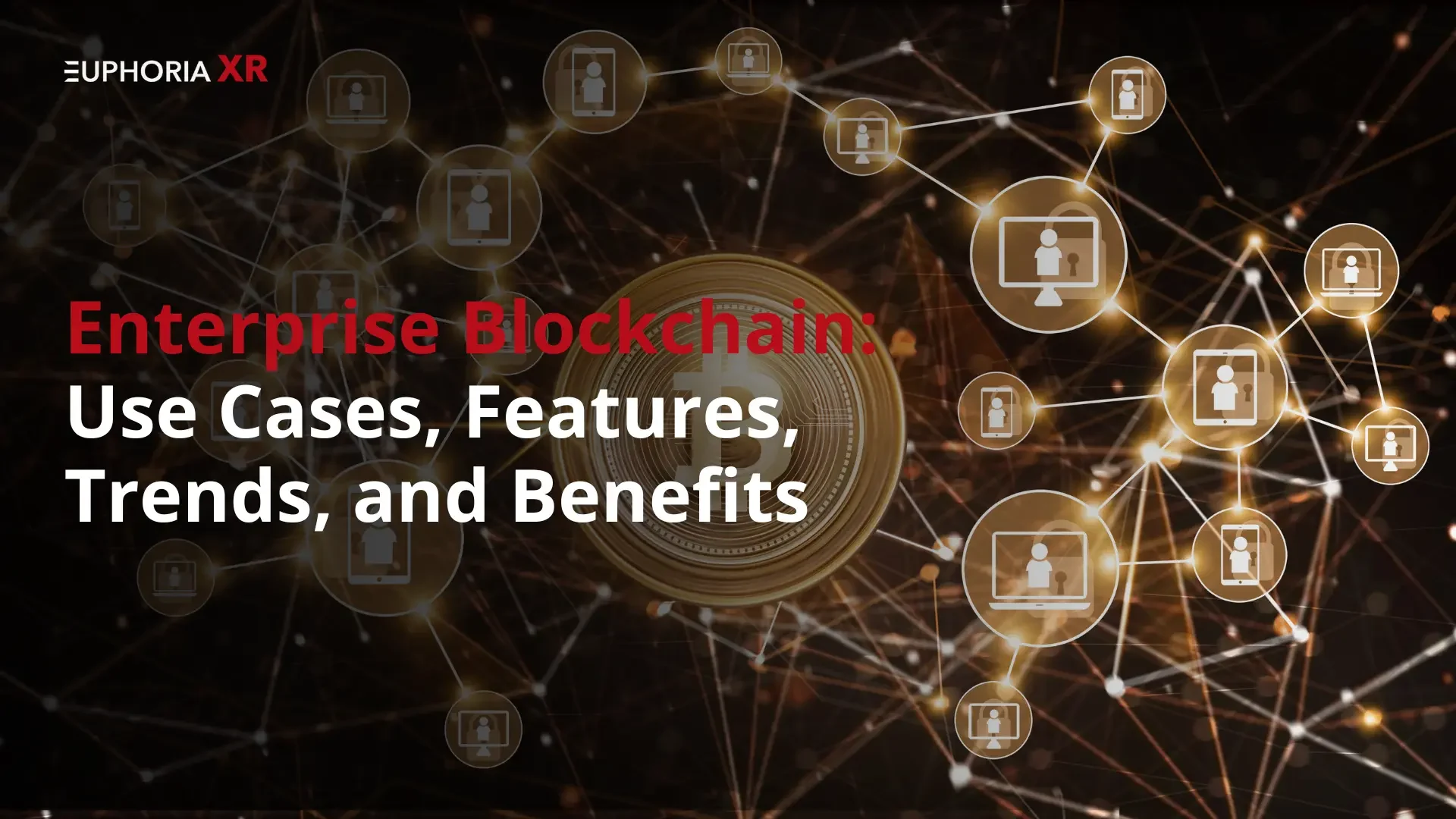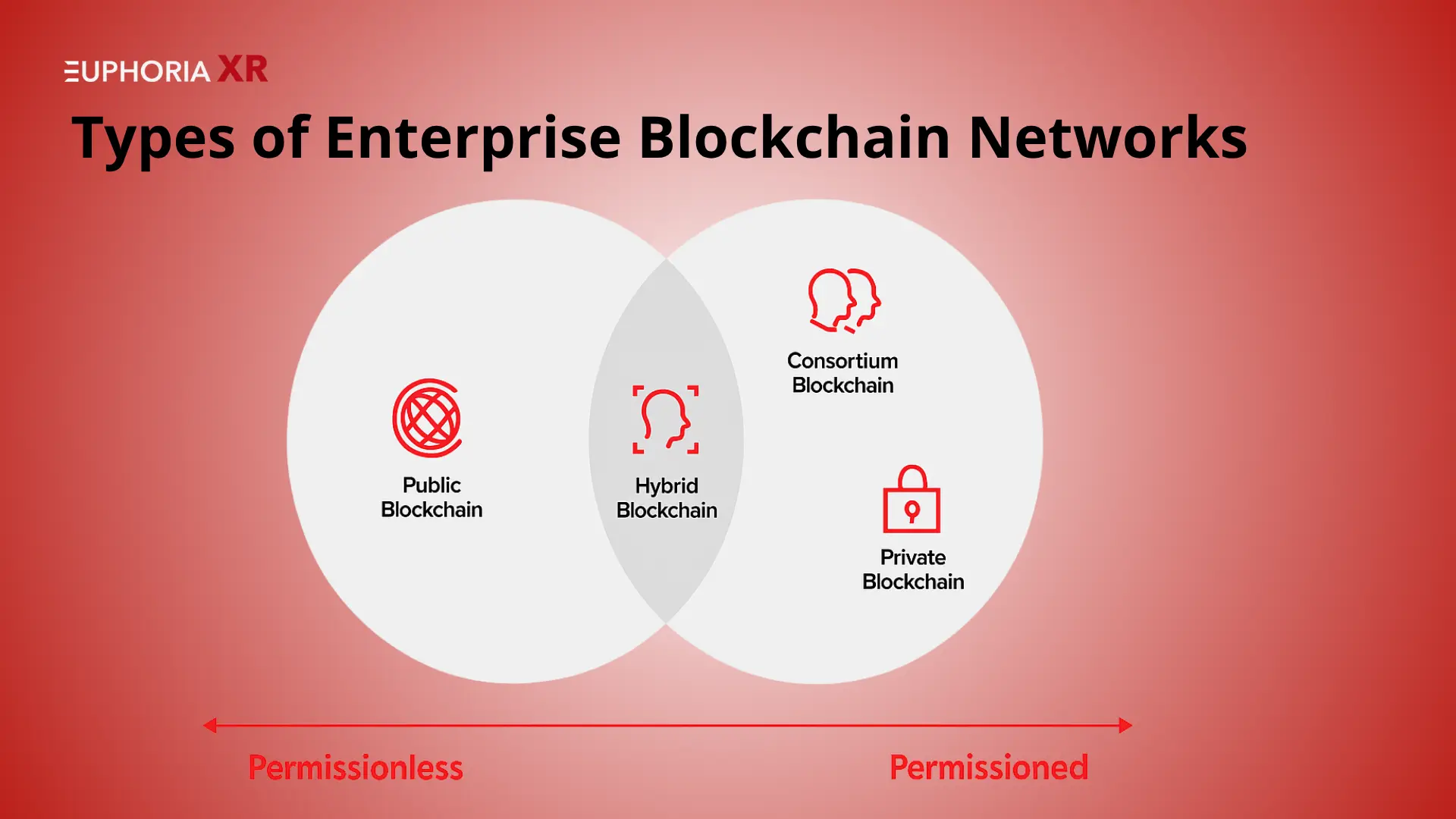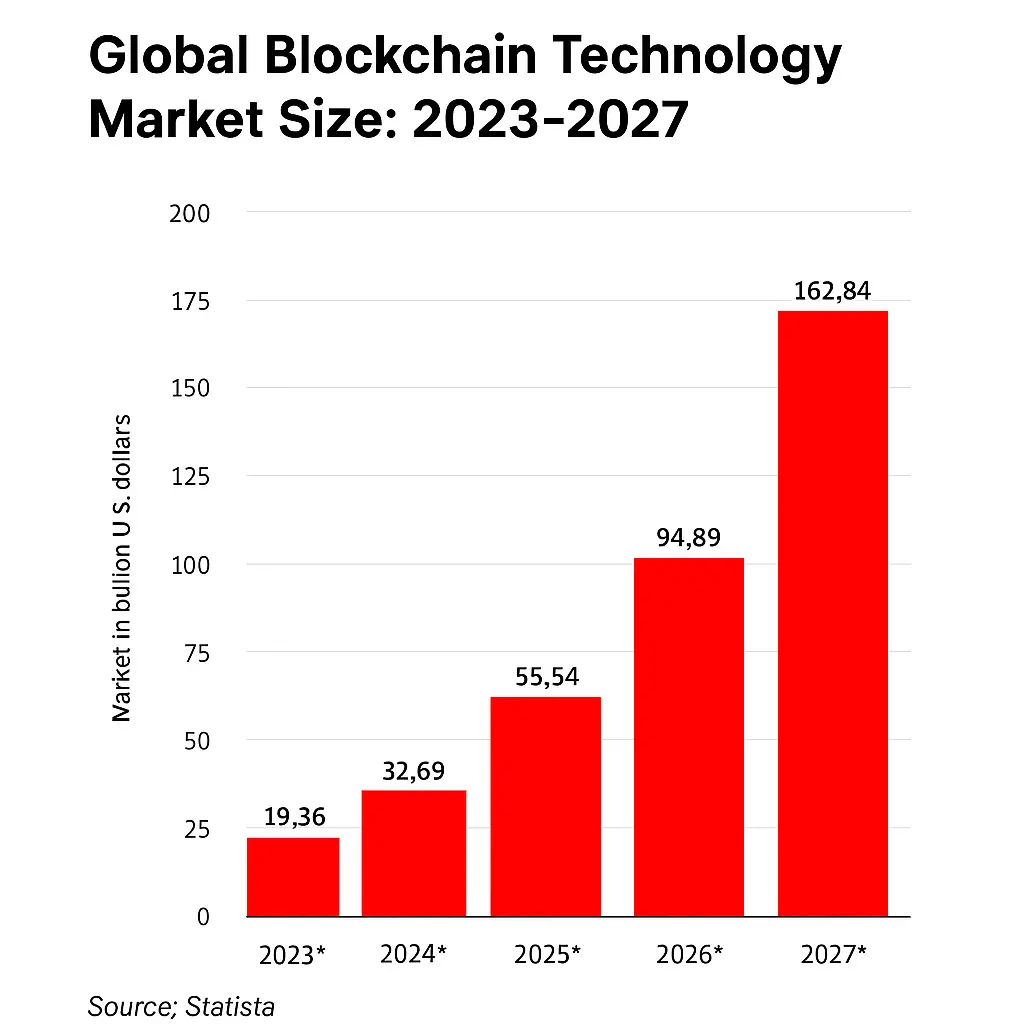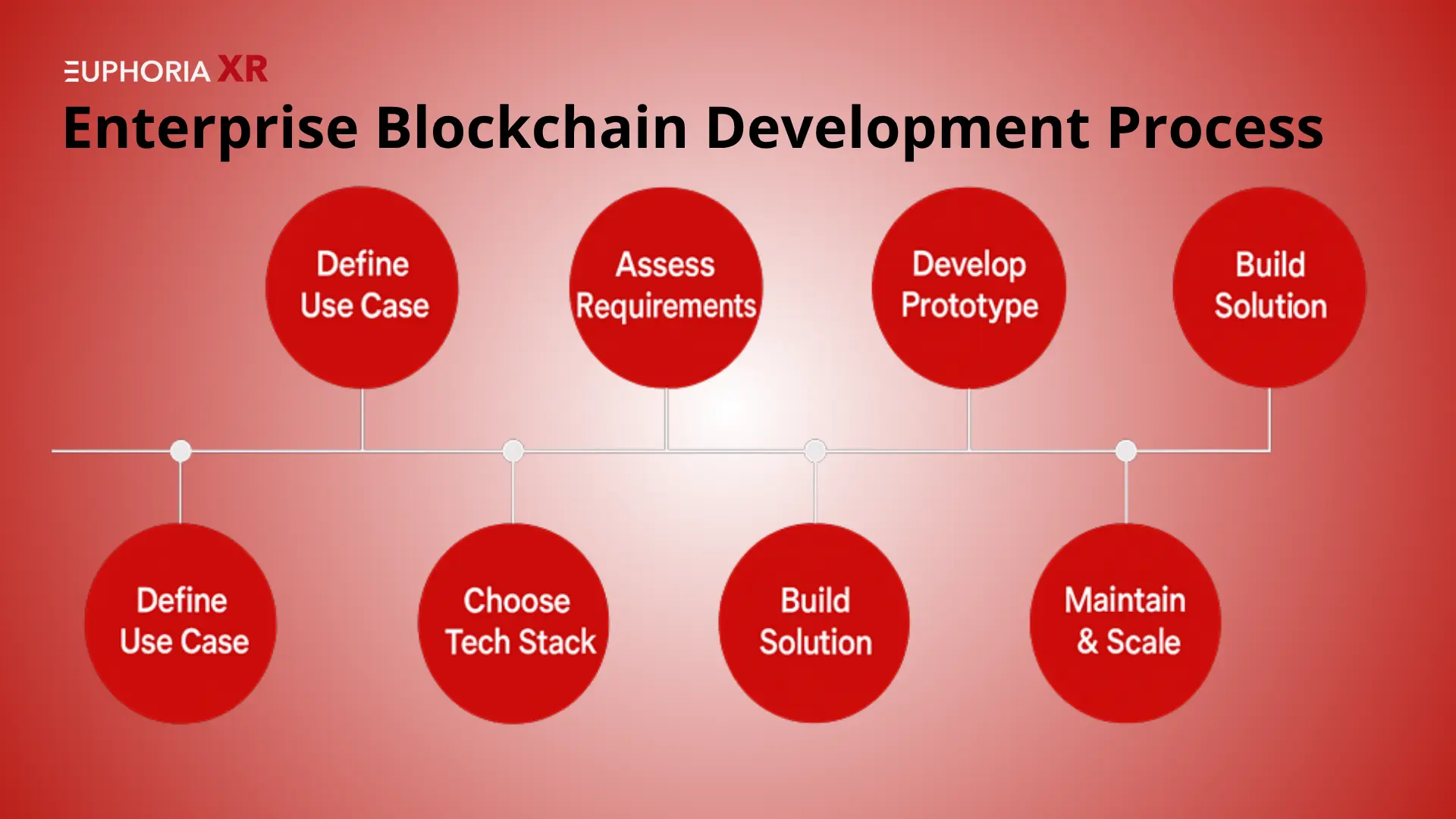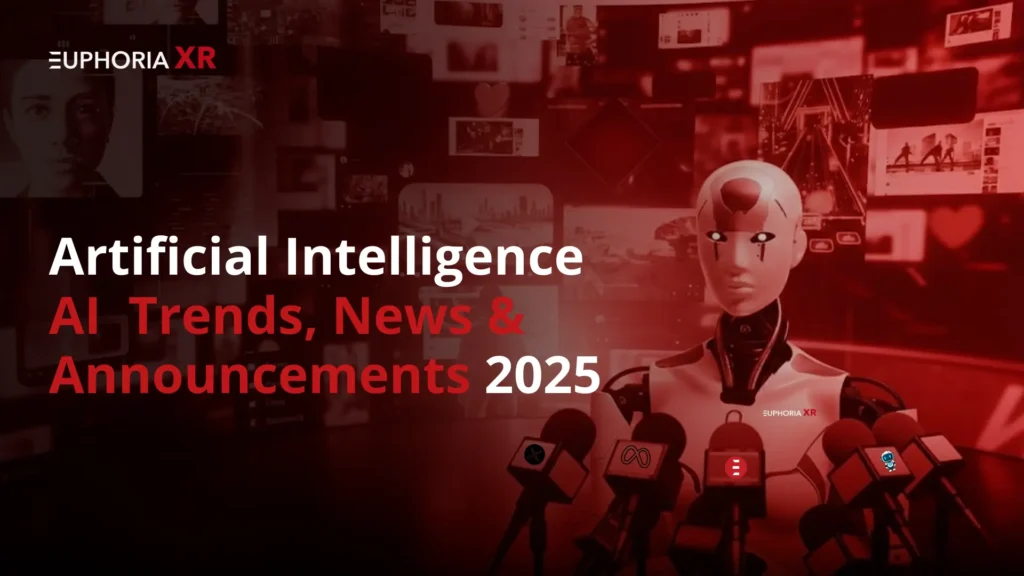What is the reason that corporations such as IBM, Walmart, or Pfizer spend millions on blockchain technology?
It is no longer about the crypto wave. It is a matter of establishing trust, reducing expenses, and automating business processes in one safe system. Enterprise Blockchain Development is where it comes in. Finance is no longer the only sector that can enjoy this muscle. It has reformed everything, including supply chains, healthcare, by providing organizations with a tamper-proof method to track information, ownership verifications, and the elimination of third parties.
In case you have ever had experience with slowness of approvals, misalignments of records, or security danger in your company…
You are about to know why enterprise blockchain is not an option to consider, but rather, the future.
Turn bold ideas into reality with our enterprise blockchain solutions. Let’s build future-ready platforms from top Blockchain Business Ideas to Develop in 2025.
What is Enterprise Blockchain Development?
Enterprise blockchain is a type of blockchain used in
secure and private businesses. It is not like a public blockchain (such as Bitcoin), in which any user may participate; enterprise blockchain networks are permissioned, and only approved entities can view or modify data.
Just imagine a collective digital notepad. All these people who are in your business network view the same version, and when any changes are made, they are immediately recorded, and nobody can delete or modify the previous entries. This creates trust, transparency, and effectiveness, particularly in industries where various parties are required to exchange data in a secure manner.
Cryptocurrency is the origin of blockchain. However, it is currently applied by businesses in tracking products, authentication of documents, as well as automation of contracts, among others. That is the revolution: crypto technology logistics to business-level systems running the business world.
Types of Enterprise Blockchain Networks
Permissioned Blockchain
The network can only be accessed and used by a few members. Suitable for companies that require privacy, control, and compliance.
Consortium Blockchain
Managed by a group of institutions and not a single one. Occurs frequently in supply chain, finance, or sectors with an established need for cooperation of trusted parties.
Hybrid Blockchain
It merges both public and private characteristics. Companies are able to maintain private information as well as make some of the information publicly available.
Public Blockchain (Open Chain)
Free and open, sometimes modified to suit commercial applications (e.g., Ethereum Enterprise). Most appropriate for businesses that require maximum transparency and decentralization.
Enterprise Blockchain Market Insights
Market Size & Growth
In 2023, the global enterprise Blockchain Market amounted to approximately $9.6 billion and is expected to increase exponentially and reach up to $287.8 billion, and a CAGR of 47.5 percent.
Even more broadly, the overall Blockchain Market Approximately $20 billion in 2024, and it is estimated to increase by 65.5% per year, with the overall result of approximately $248.9 billion in 2029.
It is similar to putting a small tree in the ground and turning it into a giant tree in less than zero to ten years; the blockchain is booming.
Industry Adoption Trends
Finance & Banking in the lead: BFSI (Banks, Financial Services, Insurance) represented close to 40 percent of the total market in blockchain in the year 2024
Hybrid blockchain (public + private) is 42%, and it will take first place in the merger between blockchain and AI/IoT .
The region with the highest growth rate ( promoting 61 to 62 % in CAGR ) is Asia-Pacific, whereas the North American market is the current leader, boasting approximately 43 to 46 percent market share
Key Components of Enterprise Blockchain Systems
Consensus Algorithms
The consensus algorithms assist all users to reach on what is true in the system. They verify all the transactions before inclusion in the ledger. This makes the fake and alteration of data impossible without group consensus.
Smart Contracts
Smart contracts are pieces of code that are rules that have been implemented and executed automatically. They put through deals once the conditions are met, with no delays and middlemen. An example would be that the payments may be made once the goods are delivered.
Distributed Ledger
A distributed ledger is a digital information that is shared among all the nodes. It records all the transactions in a manner that is not changeable. The same verified information is available to all people within the network.
Nodes
Computers that maintain the running of the blockchain are known as nodes. They are the storage holders of the ledger, they execute smart contracts as well as validate the new blocks. The greater the nodes, the more secure it is and performs faster.
Virtual Machines
Smart contracts are executed in a secure environment by using virtual machines. They ensure that the code will be functional but will not damage the network. A prominent example used in many enterprise apps includes the Ethereum EVM.
Use our end-to-end Blockchain Development Services to transform your most complex processes into automated solutions.
Must-Have Features of Enterprise Blockchain Solutions
Decentralization
The network cannot be controlled by a single party. This is a shared responsibility. This minimizes the possibility of failure, fraud, or bias. It establishes credibility among all the users and partners.
Immutability
As soon as it has been entered into the blockchain, it stays there forever. This can not be tampered with and gives a clear history of changes. Ideal for audit, compliance, and accountability.
Permissioned Access
The network can be accessed or changed only by the approved users. This is essential in maintaining confidential information in businesses. This is used by businesses to regulate what can be seen by whom.
Transparency
Each of the participants accesses the same version of the data in real-time. This leaves everybody on a common ground and builds trust. It minimizes misunderstanding and disagreement as well.
Interoperability
Your other systems should also be suitable to work well with a good blockchain. These are CRM, ERP, cloud applications, and others. Blockchain is much more usable due to the ease of integration into the system.
Smart Contract Automation
Smart contracts replace tiresome actions with automated tasks. They decrease incidences of manual errors and accelerate decision making. It is amazing in approvals, payments, compliance, and logistics.
Scalability
As your business increases in size, your blockchain needs to move alongside you. It ought to serve additional users, data, and transactions conveniently. This guarantees long-term performance and value.
Auditability
Each transaction is time-stamped together with the user ID. Auditing, reporting, and tracking become easy and quick. It assists companies in complying with regulations easily.
Top Benefits of Enterprise Blockchain Development
Enhanced Security
Enterprise blockchains apply the highest level of cryptography and distributed storage to secure data. All transactions are stored on several nodes, and this makes it almost impossible to hack or interfere with them. This provides the companies with a secure base to carry out sensitive activities with secure confidence.
Cost Reduction
Blockchain saves businesses money by eliminating middlemen and decreasing paperwork. Smart contracts will automate most of the routine activity that would take up manual labor, such as reducing the administrative expenses, legal expenses, and reconciliation expenses across departments.
Operational Efficiency
Blockchain also simplifies the process of conducting business as it eliminates bottlenecks. Instant processing of the transactions, automated workflow with tasks that previously required days, namely approvals or payments, can be done in a few seconds, freeing up a lot of time.
RWA Tokenization
Using blockchain, objects in the real world, such as real estate, paintings, or carbon credits, can be tokenized. The tokens are easily tradable, or they may be divided, and this trait enables businesses and investors more freedom and options to generate new revenues.
Transparency
Enterprise blockchain makes the same data visible across the network and available in real-time. This collective transparency decreases confusion and generates confidence between business, regulator, and customer partners.
Traceability
Each transaction on blockchain is time-stamped and identified by a unique ID. This forms a continuous chain of events and aids businesses in tracing products, their authenticity, and a timely response to any problem, such as a recall or fraudulent activity.
Data Integrity
Data once written to the blockchain cannot be changed or deleted. This will ensure your records are accurate and reliable, and, in particular, when performing audits, disputing, or checking compliance.
Compliance Support
Tracking is a trait of blockchain, and thus, it is easy to adhere to policies. Pre-installed tracking, as well as time stamping, allow legal needs to be kept on track. Businesses will be able to make reports, demonstrate activity history, and remain in line without extra complexity.
Are you prepared to create a blockchain that is as resilient as your company? EuphoriaXR will demonstrate how.
Enterprise Blockchain Use Cases by Industry
Supply Chain
In supply chain management and logistics, blockchain will enable companies to manage products as they move and trace in real-time, from source to the shelf. This enhances transparency, decreases counterfeit goods, and assists in controlling inventory and the responsibility of suppliers.
Healthcare
Blockchain allows medical facilities to store patient data without privacy risks and transfer the information between hospitals or laboratories safely. It is correct or accurate data, to the extent of even preventing pirated medicines in the pharmaceutical distribution channel.
Real Estate
Blockchain streamlines the sale and rent of property. Transaction transfer and payments are some of the processes automatically done on smart contracts, which reduces delays and fraud and provides buyers and sellers with a more secure experience.
Education
Students can complete educational institutions and receive blockchain-powered diplomas and certificates that would be simple to check by an employer. This would get rid of counterfeit degrees and save time spent on carrying out background checks when hiring.
Gaming
Players would become the legal owners of their digital game peripherals, such as skins or weapons, all in the form of a token when it comes to blockchain gaming. These assets are able to be exchanged or transacted between games or between platforms, and this adds a real-world value to a virtual accomplishment.
Media & Entertainment
Smart contracts with blockchain allow royalties to be equally distributed among artists, writers, and other creators. It safeguards intellectual property, and payments are automatically retrieved when content is accessed or even streamed.
Travel & Hospitality
Blockchain also makes travel experiences more efficient, whether it is securing identity verification or booking management. It decreases double-bookings, increases its loyalty programs, and allows users to control their travel stuff in full control.
Finance
Blockchain allows banks and financial companies to make faster transactions with fewer errors and fees. The use of blockchain lowers the need for third-party clearinghouses that slow down financial operations and decrease trust in them.
Retail
Retailers apply blockchain in authenticating products, as well as tracking them within the supply chain. Customers have the right to scan some code and find out the origin of their food or clothing, enhancing openness and providing brand loyalty.
Government
Blockchain for voting systems, land registry, identity verification, and other records is what the government is experimenting with. It brings efficiency, minimises fraud, and gives citizens access to more secure access to government services.
Leading Platforms for Enterprise Blockchain Development
Ethereum
Ethereum is one of the most popular blockchain platforms, and it enables smart contracts and decentralized applications (dApps). To businesses, its Ethereum Enterprise Alliance provides scalable solutions, and has an excellent community and developer coverage. It is perfect for projects that require tokenization and programmable logic.
Hyperledger Fabric
Hyperledger Fabric is a permissioned blockchain that is modular and can be used by businesses and is backed by the Linux Foundation. It is compatible with exclusive channels, high transaction speed, and complicated workflow, which is why it fits best in the domain of finance, supply chain, and healthcare.
R3 Corda
Corda has been developed to target financial institutions and regulatory consent. It provides private transactions and legal contract verification. Even though it is not a traditional blockchain, it has its share of distributed ledger tech to house secure, shared records.
Quorum
Quorum is an Ethereum-based business product initially designed by JPMorgan. It encourages fast processing, privacy, and regulatory compliance design, which makes it very appropriate in banking, insurance, and capital markets.
XDC Network
XDC is a hybrid of both the public blockchain and the private blockchain. Energy efficient, low-cost, and fast, it is widely utilized in trade finance, tokenization, and International payments.
Hyperledger Sawtooth
Sawtooth is another project developed by Hyperledger and is meant to be scalable and flexible. It can support various consensus mechanisms, and it has already been applied to digital identity, food tracking, and energy trading industries.
Enterprise Blockchain Development Process
Define Use Case
First of all, you should identify what you want to solve. One way to enhance blockchain success is to ensure that a clear goal is specified, be it document verification, asset tracking, or transparency in the supply chain.
Assess Requirements
Analysis of what will be required by the project includes data flow, user access, compliance, and what is expected out of the project. It is the step by which your tech stack and timeline are established.
Choose Tech Stack
To work on the blockchain platform (e.g., Ethereum, Hyperledger) and tools (smart contracts, APIs, cloud services), select a platform depending on your needs. This will define the efficiency of your solution in terms of security, scalability, and flexibility.
Develop Prototype
Construct a minimum viable product (MVP) or demonstration of the concept. This enables you to test with actual customers, collect their feedback, and tune things up before going live.
Build Solution
When the prototype has been successful, proceed to full development. These are coding contracts, connection with the existing systems, executing user roles, and checking data accuracy.
QA & Launch
Test it all robustly, including performance, security, compliance, and bugs. After ensuring that the system is stable, launch it to your users and commence real-time monitoring.
Maintain & Scale
Once in production, constantly improve the performance, manage changes, and scale to maintain user demand. Maintenance provides your blockchain with security, speed, and the future.
Common Challenges in Enterprise Blockchain Adoption
Scalability
Most blockchains fail to process large volumes of transactions within a short period. In case of large enterprises, real-time operations may be blocked due to slow speed or network congestion. This turns out to be a bottleneck with increased adoption.
Integration
It can be difficult to integrate blockchain with legacy systems such as CRMs, ERPs, or databases. The process causes delays and additional expenses in many companies.
Easy adoption is more important.
Regulations
The information processed by the blockchain is likely to be sensitive, and the transactions conducted are financial. However, it is complicated since laws differ in different countries and industries, and are therefore a complex hurdle. It is required to keep updated on the changes in the law.
Interoperability
The major part of blockchains does not communicate. This makes the transfer of data or assets between systems or networks difficult. It does not make it flexible and hinders innovation.
Privacy
Businesses should secure customer and firm information. Sensitive information does not always suit the public blockchains. The privacy-preserving solutions are frequently needed.
Talent Gaps
Blockchain development remains selective. People who can work on smart contracts, security, and architecture are difficult to find. The inexperience might slow down project schedules.
Related: https://euphoriaxr.com/blockchain-as-a-saas-vs-custom-blockchain-development/
Solutions to Overcome Blockchain Challenges
Use BaaS
Platforms such as Hyperledger, AWS, or Azure Blockchain allow businesses to develop more quickly. They provide ready-made tools, hosting, and security-overhead reduction.
Modular Development
Do not blow all your money at once; start small with a pilot or MVP. This reduces the risk and allows you to test direct performance in the real world before scaling.
Compliance Alignment
Collaborate with compliance departments to ensure legal compliance of your blockchain with local and international laws. Audit trails, access controls, and data protection measures should be designed on the first day.
Interoperability Tools
They can interrelate blockchains using frameworks such as Polkadot, Cosmos, or Chainlink. These applications assist you in shifting information and resources through platforms safely.
Staff Training
Train business, as well as developer teams, on blockchain. Knowledge gaps can be eliminated by courses, certifications, and workshops, accelerating the adoption.
How to Choose an Enterprise Blockchain Development Company
Industry Experience
Search for a team that has worked in your niche, such as healthcare, logistics, or finance. Experience implies that they will know what you are going through and speak your language.
Technical Expertise
An excellent company must know about such platforms as Ethereum, Hyperledger, or Corda. They ought to be conversant with smart contracts, security protocols, and APIs as well.
Security Standards
Ensure they adhere to applicable industry best practices on data protection. It encompasses encryption, access controls, and safe smart contract development.
Team Capability
Select a team including the designers, developers, testers, and architects of blockchain. Multifunctional expertise implements ideas to launch simply.
Maintenance Support
Blockchain is not a set-and-forget mechanism.
Choose a company that can provide monitoring, updates, and scaling of your application after launch.
Why Choose EuphoriaXR for Enterprise Blockchain Development
We redefine complex business ideas and turn them into scalable and secure blockchain systems at EuphoriaXR.
Our team has extensive experience with smart contracts as well as large-scale enterprise platforms across a range of industries, such as finance, logistics, and healthcare.
Our priority is security-first design, integrative ease, and maintenance after delivery: to make sure your blockchain is ready in the long term.
Partnering with us means you gain much more than developers, because you get partners who care about your business needs.
Suggested Read: https://euphoriaxr.com/top-12-blockchain-development-companies-in-usa/
The Future of Blockchain in Enterprise
AI & IoT Integration
Blockchain will partner up with both AI and IoT in order to make real-time decisions and automatically process maintenance and tracking of logistics.
Tokenization
Additional assets such as real estate, art, and others will become tradable in digital forms through blockchain, creating new markets and liquidity opportunities.
Blockchain Sustainability
With the expansion of blockchain, there would be an increase in emphasis on energy-efficient models. The power-hungry mining will be done away with by giving way to green consensus algorithms.
BaaS Adoption
Blockchain-as-a-service platforms will make it easier to embrace, allowing enterprises to construct without intense infrastructure or the use of codes.
Quantum Security
Blockchains will be able to avoid the threat of future quantum computer adversaries since they will be reinforced with new cryptography.
Regulatory Standardization
The government and industries will possess better guidelines and regulations to accommodate blockchain, easing enterprise arrangements and reducing the risk of inconveniences.
Conclusion
Enterprise blockchain development is not a luxury anymore.
It is a strategic property to businesses in need of quicker processes, improved visibility and enhanced security.
Build your business a better future. Develop a Blockchain Application to track products, automate contracts, and secure your data with scalable technology.
At EuphoriaXR, we assist you in turning ideas into action with professional attention throughout.
Keen to learn about blockchain for business? Let’s talk.
FAQs
What is enterprise blockchain?
It is a permissioned, nonpublic blockchain fitted to companies. It enables safe, open, and cost-effective data-sharing between trusted partners.
What platforms are best for enterprise use?
Well-known platforms are Ethereum, Hyperledger Fabric, R3 Corda, Quorum, and XDC Network. They have various uses depending on security and speed, and use cases.
How long does development take?
The average time to build a typical enterprise blockchain solution is 3-6 months, based on the complexity, integrations, and compliance requirements.
Is enterprise blockchain secure?
Yes. It employs sophisticated encryption algorithms, controlled access, and consensus models to create tamper-free data and integrity of the system.
Can it integrate with existing systems?
Absolutely. With the help of APIs and middleware, enterprise blockchains may be linked with CRMs, ERPs, cloud, and other tools.

